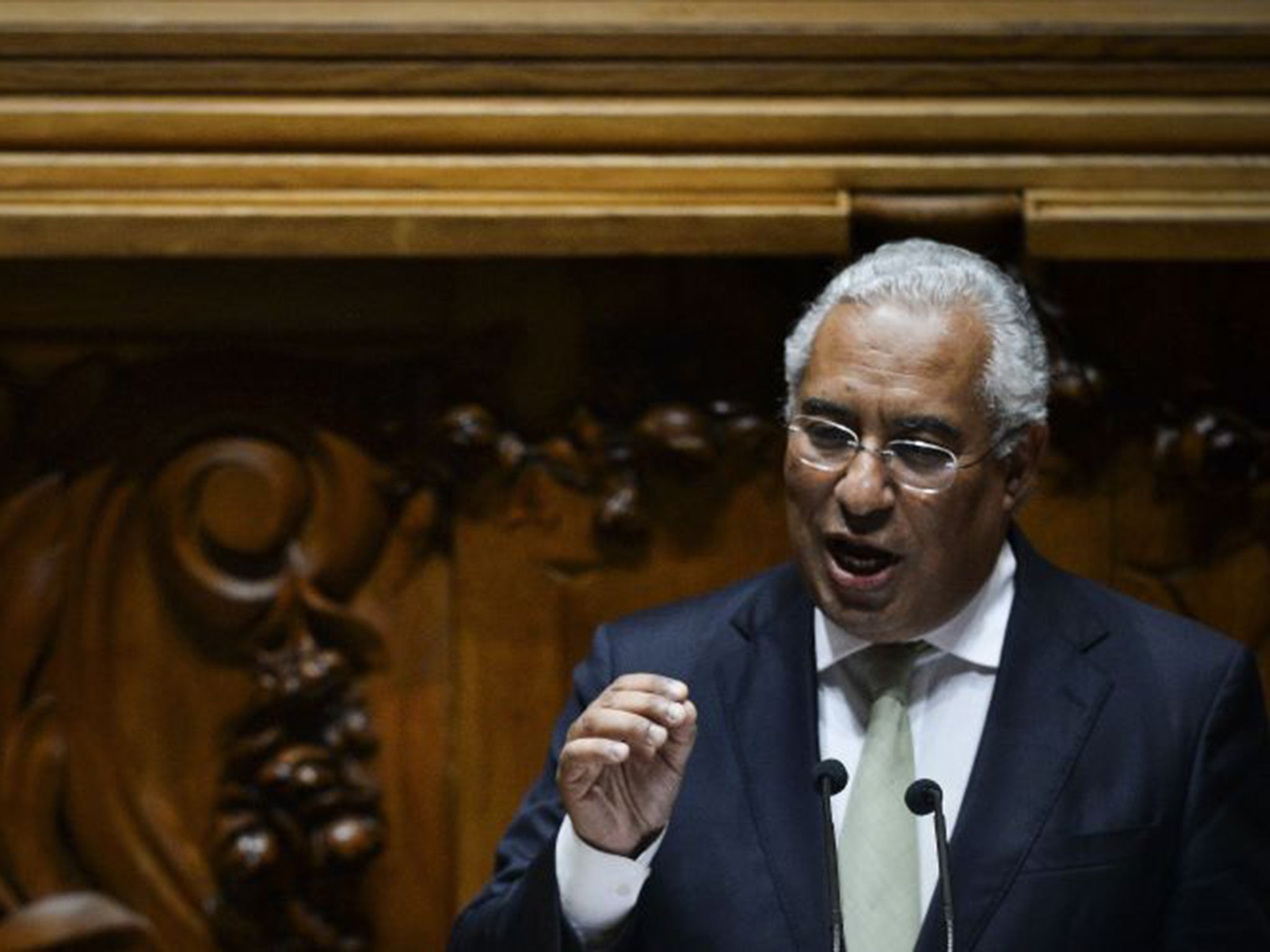Portugal government ousted: Leftist coalition prepares to take helm after previous administration’s 11-day reign
Socialist Party leader, Antonio Costa, ready to become prime minister after leading charge against short-lived centre-right rule

Your support helps us to tell the story
From reproductive rights to climate change to Big Tech, The Independent is on the ground when the story is developing. Whether it's investigating the financials of Elon Musk's pro-Trump PAC or producing our latest documentary, 'The A Word', which shines a light on the American women fighting for reproductive rights, we know how important it is to parse out the facts from the messaging.
At such a critical moment in US history, we need reporters on the ground. Your donation allows us to keep sending journalists to speak to both sides of the story.
The Independent is trusted by Americans across the entire political spectrum. And unlike many other quality news outlets, we choose not to lock Americans out of our reporting and analysis with paywalls. We believe quality journalism should be available to everyone, paid for by those who can afford it.
Your support makes all the difference.The leader of Portugal’s Socialist Party has declared himself ready to govern after one of the most tumultuous weeks in the country’s recent political history.
Despite a chorus of naysayers warning that his leftist coalition would ruin Lisbon’s fragile economic recovery, Antonio Costa said he was ready to become Portugal’s next prime minister. The declaration came 48 hours after he had led the charge against a nascent centre-right administration that lasted just 11 days.
Mr Costa, a former Mayor of Lisbon, has promised not to wreck Portugal’s return to growth and had previously announced that he would broadly stick to strict spending limits imposed by the centre-right government before last month’s general election. The centre-right group – known as Portugal Ahead – won the largest single number of votes and seats in the election held on 4 October, but a coalition of leftist parties, led by Mr Costa’s Socialist Party, is able to command a majority in parliament. On Tuesday, it backed a no confidence motion against the newly appointed government, promising instead an end to some of the spending restrictions and to a privatisation programme.
In an interview with the magazine Visao, Mr Costa said “we have the conditions to form a government immediately” and that “the political scenery is original and asks also for an original governmental solution”.
In fact, Mr Costa and his potential partners, the radical Left Bloc (the BE) and the Communist Party (PCP), are likely to have to wait at least a week. The country’s President, Anibal Cavaco Silva, has said that he will consult political leaders, trade unions and business groups before deciding whether to appoint a new coalition, or call fresh elections.
Despite Mr Costa’s assurances that his coalition would ensure long-term stability, his political opponents said that his taking power could plunge Portugal into an economic mess comparable to that of Greece.
“Sadly, you only need to look at the recent history of one of our partners in the euro, Greece, and the cost of the alleged end of austerity and the revolt against Europe’s rules to see the effect it has,” the Finance Minister Maria Luis Albuquerque said on Tuesday before the confidence motion. “What have they gained? More recession, more poverty, more unemployment and an increase of the dependency on European institutions and the IMF.”
At its heart, the dispute is about how Portugal keeps within limits imposed after Lisbon received a €78bn £55bn) bailout in 2011. The outgoing government, led by Pedro Passos Coelho, imposed severe spending cuts to keep Portugal’s budget deficit within the 3 per cent of its GDP.
The Socialists were in power when the bailout from Brussels was handed over, but broadly supported Mr Passos Coelho’s measures to reign in spending during the last parliament. Mr Costa now says that austerity can be reintroduced more slowly, and specifically, that state salaries can rise. He has also promised a 0.3 per cent increase in state pensions. “The probable consequences of this [leftist government] experiment are far from clear-cut, but they are likely to be mostly market-negative,” Antonio Barroso, Teneo Intelligence consultants vice-president, told Reuters this week.
Mr Costa’s colleagues have tried to assuage fears that he would lead Portugal back into economic difficulty. Mario Centeno, a Socialist who is expected to become finance minister in any leftist government, told the state television channel, RTP, that “Portugal is not going to follow Greece’s trajectory. Definitely not”.
He also guaranteed that “there is no risk of a new bailout programme” and that a left-wing government wants to “turn the page on austerity” but in a “controlled and financially responsible” way.
The caretaker government of Mr Passos Coelho approved the sale of the loss-making state airline, TAP, despite the Socialists writing to the company’s parent, Parpublica, urging them to stop the privatisation.
Join our commenting forum
Join thought-provoking conversations, follow other Independent readers and see their replies
Comments